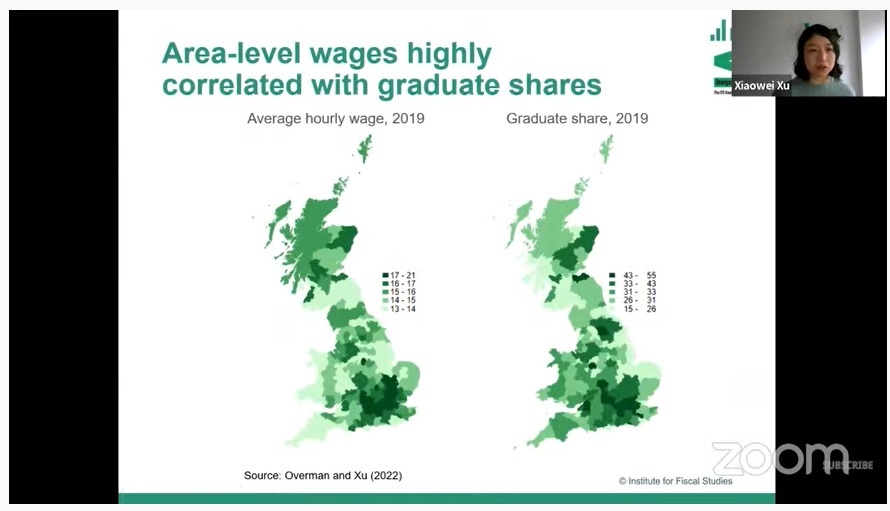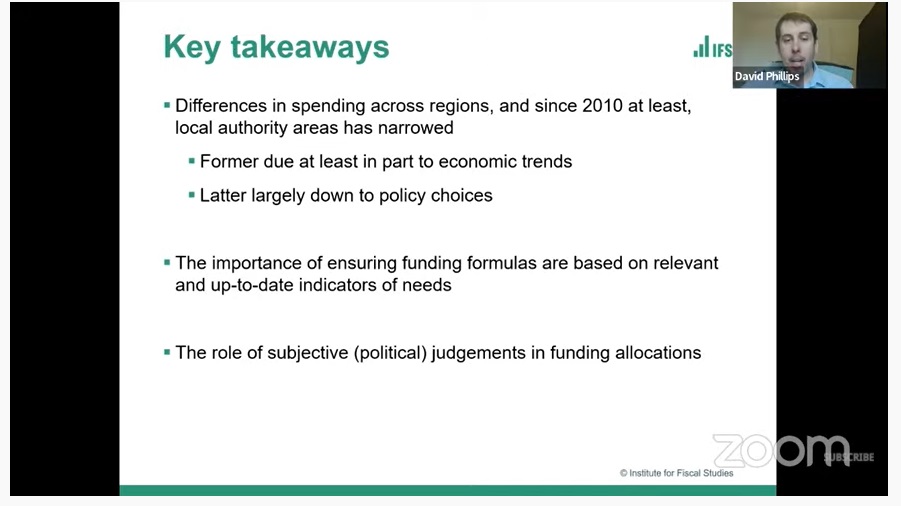
Looking forward to what should be a very timely discussion on the IFS's latest research geographic inequalities in labour market outcomes & how this may present challenges for the Govt's #LevellingUp agenda #IFSEvents
https://twitter.com/TheIFS/status/1489182772371542017
First @PJTheEconomist and the @NuffieldFound's @markfranks give a brief overview of the IFS #DeatonReview into inequalities, and why the Nuffield Foundation gave the review its financial support #IFSEvents
Franks recognises that #LevellingUp will only be delivered if we focus on multiple factors of #inequalities - age, gender, education, public services, jobs - not just place #IFSEvents
However, while a place-based focus alone will not deliver #LevellingUp, Franks also recognises that #LevellingUp will not be successful if policymakers do not have an in-depth understanding of local needs #IFSEvents
Next Xiaowei Xu gives an overview of the patterns of geographical of inequalities in pay and employment, and how this could impact on the government's #LevellingUp agenda #IFSEvents
Xu notes that the UK is regionally imbalanced when it comes to levels of employment and high wages. Notes that areas with low wages are not necessarily areas with low unemployment #IFSEvents 

On the importance of skills, Xu notes that areas with high levels of graduates tend to have higher wage rates. Indeed, graduate share accounted for 50% of wage variance in 2019 #IFSEvents 

Xu then controls for people's individual characteristics and geographies. She notes that skills have a higher effect on wage variation than place, but that highly skilled people tend to live in more productive places, with higher wages #IFSEvents 



Turning to geographical inequalities, Xu notes that areas with low rates of graduates also tend to lose graduates to migration once they have obtained a degree. By contrast, areas with high graduate rates will also attract graduates through migration #IFSEvents 

As a result, Xu says that the demand for graduate jobs tends to be focused in areas with high-skilled workforces. This creates a "vicious circle" for poorer areas, where graduates move from poorer areas to richer areas, which in turn means lack of graduate jobs #IFSEvents
However, Xu says there are some outliers where there are high numbers of graduates in areas with lower levels of graduate jobs, but have high reported rates of public amenities #IFSEvents
One negative implication is on house prices, with Xu noting that house prices are significantly higher in areas with highly skilled workforces in higher paid jobs #IFSEvents
Turning to recommendations for policy, Xu says that #LevellingUp will be a huge challenge for Govt. While she welcomes the commitment to "globally competitive cities" she proposes focusing on a few places at first to act as a "counterweight" to London #IFSEvents 

Philips shows how public spending redistributes wealth across the region, with only 3 regions "paying in" to the system, and large levels of public spending in other areas, with increasing amounts of money going away from #London to Midlands & Northern regions #IFSEvents 



Philips explains this is because revenues per person in #London has significantly pulled away from the rest of the regions. However, levels of public spending across the region has narrowed, with regions in the North spending less than 20 years ago & more in the South #IFSEvents
This is due to budget cuts, will have impacted higher-funded local authorities the hardest, changes to #UniversalCredit, which have evened out benefits distribution & #Pensions spending, which has risen more in the South than the North #IFSEvents
Cuts to #LocalGov spending was also significantly higher in poorer areas. Philips notes that the most deprived areas saw a 31% cut, compared to 16% in the least deprived #IFSEvents 

Philips says that these austerity cuts were a "political choice" that did not take into account how dependent a local authority was dependent on central grants. Notes that the #LevellingUpWhitePaper commits to reverse this, giving more funds to Councils of greater need #IFSEvents
However, Philips says there is still more reform needed. The additional money will still be less than prior to 2010 austerity cuts. He also notes that Govt is still using population data from 2013-14 and funding formulas from mid-2000s. #IFSEvents
Turning to school spending, Philips notes that funding for both Primary & Secondary schools for the most deprived rose at its highest rate between 2007-2010, but has since decreased over time #IFSEvents 

Explaining why this happened, Philips says this in part due to lack of updates of school funding allocations, despite the Financial Crisis creating a period of changing patterns of deprivation #IFSEvents
Phillips notes that this will change as formulas are being updated, especially the introduction of minimum funding levels. However, Phillips says there are still questions on how policies such as the Teacher Retention Premium will fit in to wider school funding policies #IFSEvent
In conclusion, Phillips repeats the need for updated funding formulas - both in Local Govt & Schools. However, funding is ultimately a political choice - & so we should observe where & how the Govt allocates money to see how they view the #LevellingUp agenda #IFSEvents 

The webinar now moves on to a Q&A session #IFSEvents
First Q is on whether viewing #London as a "travel to work" destination overlooks inequalities in the region, Johnson says yes, noting that London is one of the most deeply unequal region, but this is perhaps obscured by the high earning power of top 10% #IFSEvents
Xu agrees. Notes that geographically, rich people are geographically concentrated (especially London), whereas poor people are "spread everywhere". This means that divide between rich & poor in London is sharper, but often "hidden" from statistics #IFSEvents
Next Q is on the #LevellingUpFund & #UKSPF, particularly in 🏴. Phillips says analysis shows that in some areas 🏴 will be getting "more than its fair share" and less in other areas. Notes in some areas 🏴 has guarantees of maintaining EU Levels of funding under UKSPF #IFSEvents
On the boarder area of funding #LevellingUp, Phillips says that, under Barnet Formula, 🏴 would earn less than 🏴 as a country "than if it were considered an English region" #IFSEvents
On 🇪🇺 money, Phillips reminds delegates that EU Fund were always "spent on a lag" so (in theory), we will still be spending some EU money with UK Govt funding acting as a "top up". However says that CAP & CFP funds have received comparatively little political attention #IFSEvents
On a Q as to why graduates are used as a proxy for "high skills", Xu says that is not the case as they use all metrics that could affect wages. However, when it comes to migration, they focus on graduate jobs as degree status is the only one available in the data #IFSEvents
When asked to what extent #GenderInequality should be part of #LevellingUp, Xu says that we know there is a gap between 🚺's wages and 🚹's wages. However, these gaps are highest in certain #BAME communities & also in higher skilled jobs #IFSEvents
As a result, Xu says that we see higher #GenderPayGaps in major cities, which have a more cosmopolitan and higher-skilled workforce. ∴ if you wanted to #LevelUp based on gender, it may result to more funding going to places like London or Birmingham #IFSEvents
Phillips agrees, noting that data shows that gender wage gaps are lower in 🏴 and parts of North England where the Public Sector is a major employer - this is due to the fact that more 🚺 are likely to work in public sector roles & so will be amongst the higher earners #IFSEVents
Really interesting presentation on the challenges the #LevellingUp agenda faces. Thanks to @markwfranks @fiscalphillips & Xiaowei Xu for your presentations, to @PJTheEconomist for chairing & @TheIFS for hosting! #IFSEvents
@threadreaderapp unroll please
• • •
Missing some Tweet in this thread? You can try to
force a refresh



